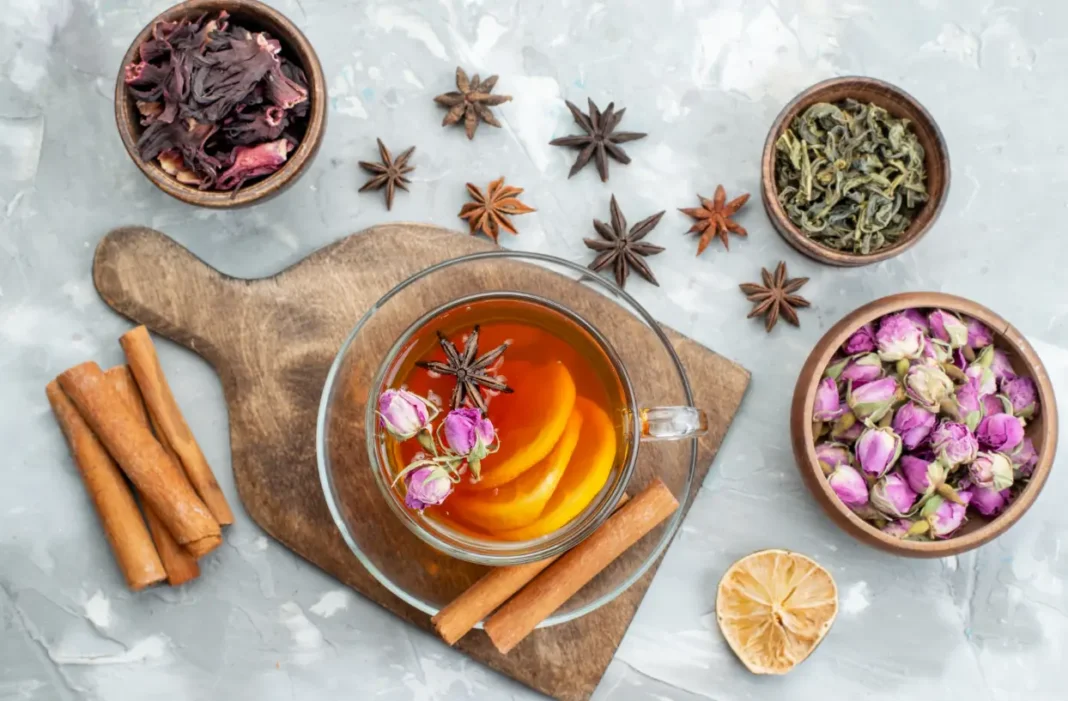Herbal tea is much more than just a soothing beverage—it’s a wellness powerhouse that has been celebrated for centuries for its healing properties.
Unlike traditional teas, which are made from the leaves of the Camellia sinensis plant (like black, green, or white tea), herbal teas are crafted from a variety of plants, herbs, flowers, and spices. The result is a beverage brimming with antioxidants, vitamins, and natural compounds that can support everything from digestion to immune health. Here’s a closer look at what makes herbal tea so beneficial for your body and mind.
Rich in Antioxidants
One of the primary reasons herbal teas are so beneficial is their rich content of antioxidants. These powerful compounds help protect the body from the damage caused by free radicals, which are unstable molecules that can contribute to the aging process and various chronic diseases. Many herbs used in herbal teas, such as hibiscus, chamomile, and rooibos, are naturally packed with antioxidants that help neutralize these free radicals.
Regular consumption of antioxidant-rich herbal teas can help reduce inflammation, support cell health, and even protect against the risk of chronic conditions like heart disease and cancer.
Supports Digestion
Herbal tea is well-known for its ability to aid digestion and soothe digestive discomfort. Ingredients like peppermint, ginger, and fennel have been traditionally used to relieve common digestive issues such as bloating, indigestion, and nausea.
- Peppermint tea is particularly great for calming an upset stomach, while also helping with gas and cramping.
- Ginger tea is famous for its anti-nausea properties, making it a go-to for morning sickness, motion sickness, or upset stomachs.
- Fennel tea is often used to reduce bloating and improve overall digestion by stimulating the production of digestive enzymes.
Incorporating these herbal teas into your daily routine can help keep your digestive system functioning smoothly and comfortably.
Boosts Immunity
Herbal teas can also support and strengthen the immune system. Many herbs, such as echinacea, elderberry, and ginger, are known for their ability to fight off infections and reduce the severity of illnesses.
- Echinacea is often used to shorten the duration of a cold, while elderberry has been shown to have antiviral properties that can help reduce symptoms of flu and colds.
- Ginger not only supports digestion but also has anti-inflammatory and antioxidant properties that help boost the immune system and reduce the severity of infections.
Drinking herbal teas made from these immune-boosting herbs can provide natural, gentle support for your body’s defense mechanisms, especially during flu season.
Promotes Relaxation and Stress Relief
Herbal teas are famous for their calming effects, making them ideal for stress relief and relaxation. Ingredients like chamomile, lavender, and lemon balm are all known for their ability to ease anxiety and promote a sense of calm.
- Chamomile tea is often recommended for insomnia and stress because it helps relax the body and mind, making it easier to wind down before bed.
- Lavender tea is another wonderful choice for reducing anxiety and promoting relaxation, especially after a long, stressful day.
- Lemon balm, a member of the mint family, has a soothing effect that can help calm your nerves and improve your mood.
Sipping on a warm cup of herbal tea before bed or during moments of tension can be a great way to decompress and restore balance to both your body and mind.
Hydration Without Caffeine
Herbal teas are naturally caffeine-free, which means they’re a great option for those looking to stay hydrated without the stimulating effects of caffeine. Whether you’re trying to reduce your caffeine intake or simply enjoy a warm beverage at any time of day, herbal teas offer a great alternative to caffeinated drinks like coffee or black tea.
Drinking herbal tea helps maintain proper hydration levels, and the wide variety of flavors means you can enjoy a satisfying beverage without the worry of caffeine disrupting your sleep or energy levels.
Supports Healthy Skin
Herbal teas aren’t just good for internal health—they can benefit your skin as well. Many herbal ingredients, like chamomile, green rooibos, and nettle, are known for their ability to promote healthy skin and reduce inflammation.
- Chamomile tea has soothing and anti-inflammatory properties that can help with skin irritation and conditions like eczema or rosacea.
- Green rooibos is packed with antioxidants that fight free radicals, which can help reduce the appearance of wrinkles and signs of aging.
- Nettle tea is rich in vitamins A and C, which can promote healthy skin and hair by fighting off oxidative stress.
Drinking herbal teas can support skin health by hydrating and nourishing the body from within.
Weight Management Support
Certain herbal teas can also assist with weight management by boosting metabolism or helping with appetite control. Green tea (though technically not an herbal tea) and herbs like dandelion root or peppermint have been shown to have natural diuretic effects, helping to flush out excess water and reduce bloating. Additionally, herbal teas like fennel can help curb cravings, making them a great choice for those looking to manage their weight.
Conclusion
Herbal tea is more than just a relaxing beverage—it’s a natural, health-boosting elixir that supports digestion, strengthens immunity, promotes relaxation, and improves skin health. By incorporating a variety of herbal teas into your daily routine, you can enjoy both physical and mental wellness benefits, all from the comfort of a warm cup. Whether you’re looking for stress relief, digestive support, or immune-boosting properties, there’s an herbal tea for every need. So, why not make herbal tea your daily ritual and embrace the powerful benefits it offers?




